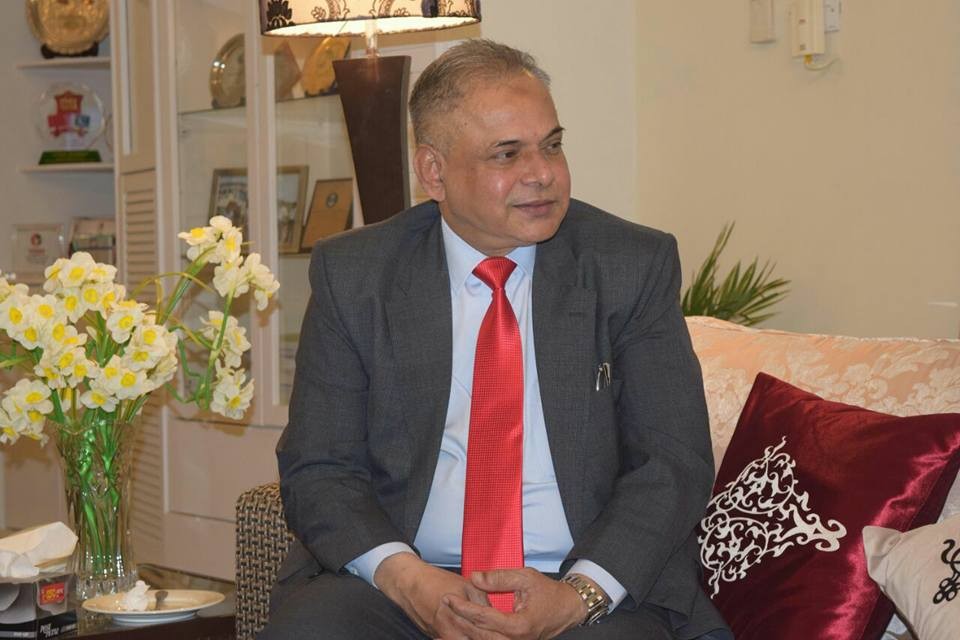 KATHMANDU, March 1 (Nepal Foreign Affairs)–Amjad Hussain B. Sial, a senior Pakistani diplomat, has assumed office of Secretary General of SAARC (South Asian Association for Regional Cooperation) on Wednesday.
KATHMANDU, March 1 (Nepal Foreign Affairs)–Amjad Hussain B. Sial, a senior Pakistani diplomat, has assumed office of Secretary General of SAARC (South Asian Association for Regional Cooperation) on Wednesday.
Sial has replaced Arjun Bahadur Thapa whose three-year tenure as the SAARC Secretary General expired on Tuesday.
Sial is the 13th Secretary General of the regional body which was founded in 1985.
This is the second time Pakistan appointed its diplomat for the SAARC top post. Earlier in 1996, Naeem U. Hasan from Pakistan had served as the sixth secretary-general of the SAARC.
Sial is a seasoned diplomat from Pakistan Foreign Service with a career spanning over 33 years.
Sial had served as Ambassador of Pakistan to the Republic of Tajikistan from 2011-2014 and Ambassador/Alternate Permanent Representative at Pakistan Mission to the United Nations New York. Before joining SAARC Secretariat he was Special Secretary at the Ministry of Foreign Affairs of Pakistan.
Pakistan had proposed for the post of SAARC Secretary General during a meeting of the Council of Ministers in Nepal’s western city of Pokhara in March 2016. It is Pakistan’s turn to get the post, which is held by rotation.
Despite India’s attempt to block the appointment of Sial on ‘procedural grounds’, the SAARC members finally endorsed him for the top job through a diplomatic note, sources told Nepal Foreign Affairs.
There was a huge risk of the Saarc secretariat to remain a headless body for a long time if the stalemate had prolonged and the dispute was not resolved.
This was the first time in Saarc’s troubled history that the regional body was moving towards a standoff over the secretary general’s appointment. Mr Sial’s nomination was made at the Saarc Council of Ministers in Pokhara (Nepal) in March 2016 and was endorsed by all member states.
According to a report published in Pakistan-based DAWN Newspaper, New Delhi through a diplomatic note in January had asked the secretariat to adhere to the “due working procedures” in the appointment of Mr Thapa’s successor.
“In this regard it pointed towards Article V of the MoU on the establishment of the Saarc secretariat, which details the procedure for the appointment of the secretary general and under which the appointment should be approved by the Saarc Council of Ministers comprising foreign ministers of the member states,” the DAWN report said.
The Indian position was that the nomination had to be ratified by the Council of Ministers meeting in Islamabad, which could not happen due to postponement of the summit after India and several of its regional allies pulled out of the meeting.
Pakistani officials, meanwhile, accused India of employing “delaying tactics”. They insisted that concurrence had been received from all members, including India.
A copy of an Indian diplomatic note dated May 30, 2016 conveying its concurrence to Mr Sial’s appointment as secretary general was also shared to media. New Delhi, the officials said, was unnecessarily raising issues over the appointment.
Receipt of concurrence to Mr Sial’s appointment from all eight member states was notified by the Saarc secretariat on Sept 8, 2016.
Relations between Islamabad and New Delhi nosedived last year due to the aggravating situation in India-held Kashmir.
India later accused a Pakistan-based group of attacking one of its military camps in Uri and also withdrew from the summit being hosted by Pakistan in November on the pretext of “cross-border terrorist attacks”.
The regional organisation has long been held hostage to the intense Pak-India rivalry although its charter explicitly disallows bringing regional disputes to the forum.
Indian leadership does not unequivocally say it, but a sub-regional transport agreement and statements by Prime Minister Narendra Modi indicate that India is working towards a regional bloc minus Pakistan. Furthermore, by isolating Pakistan, India is trying to gain maximum leverage and influence in the region.
Pakistan, besides its large territorial size, has been an active member of Saarc and is currently contributing 24 per cent of the secretariat’s budget.
The new SAARC Secretary General has assumed the charge of the office at a time when the SAARC process has been stalled with the postponement of the 19th SAARC summit in Islamabad last November.
Nepal, current chair of the SAARC, had decided to postpone the SAARC Summit until further notice after four nations Afghanistan, Bhutan, Bangladesh and India decided to boycott the summit in Islamabad scheduled for November 9 and 10 last year.
India and three other nations had blamed Pakistan for not creating conducive environment and not cooperating on combating cross-border terrorism in South Asia for holding the SAARC Summit, while Pakistan vehemently denied the charges.
Before Nepal’s decision to postpone the summit, Pakistan, the host nation of the summit, had announced postponement of the summit amid escalating tensions between India and Pakistan. The SAARC comprises Afghanistan, Bangladesh, Bhutan, India, the Maldives, Nepal, Pakistan and Sri Lanka.

